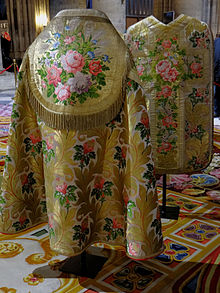
Back Brokaat Afrikaans مقصب Arabic Парча Byelorussian Брокат (тъкачество) Bulgarian Brokard Breton Brocat Catalan Brokát Czech Парча CV Brokade Danish Brokat German




Brocade (/broʊˈkeɪd/) is a class of richly decorative shuttle-woven fabrics, often made in coloured silks and sometimes with gold and silver threads.[1] The name, related to the same root as the word "broccoli", comes from Italian broccato meaning 'embossed cloth', originally past participle of the verb broccare 'to stud, set with nails', from brocco, 'small nail', from Latin broccus, 'projecting, pointed'.[2]
Brocade is typically woven on a draw loom. It is a supplementary weft technique; that is, the ornamental brocading is produced by a supplementary, non-structural, weft in addition to the standard weft that holds the warp threads together. The purpose of this is to give the appearance that the weave was actually embroidered on.
In Guatemala, brocade is the most popular technique used to decorate fabric woven by Maya weavers on backstrap looms.
Ornamental features in brocade are emphasised and wrought as additions to the main fabric, sometimes stiffening it, though more frequently producing on its face the effect of low relief. In some, but not all, brocades, these additions present a distinctive appearance on the back of the material where the supplementary weft or floating threads of the brocaded or broached parts hang in loose groups or are clipped away.[1] When the weft is floating on the back, this is known as a continuous brocade; the supplementary weft runs from selvage to selvage. The yarns are cut away in cutwork and broché. Also, a discontinuous brocade is where the supplementary yarn is only woven in the patterned areas.
- ^ a b One or more of the preceding sentences incorporates text from a publication now in the public domain: Chisholm, Hugh, ed. (1911). "Brocade". Encyclopædia Britannica. Vol. 4 (11th ed.). Cambridge University Press. pp. 620–622.
- ^ brocade: EtymologyOnline